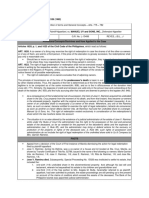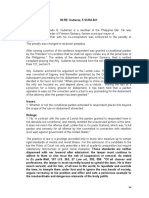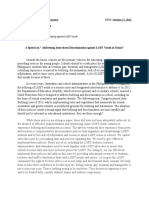BORROMEO Vs MINA Digest
BORROMEO Vs MINA Digest
Uploaded by
Ronnie Garcia Del RosarioCopyright:
Available Formats
BORROMEO Vs MINA Digest
BORROMEO Vs MINA Digest
Uploaded by
Ronnie Garcia Del RosarioOriginal Title
Copyright
Available Formats
Share this document
Did you find this document useful?
Is this content inappropriate?
Copyright:
Available Formats
BORROMEO Vs MINA Digest
BORROMEO Vs MINA Digest
Uploaded by
Ronnie Garcia Del RosarioCopyright:
Available Formats
BORROMEO
vs. MINA
G.R. No. 193747, June 05, 2013
FACTS:
Subject of this case is a parcel of agricultural land registered in the name of respondent. It
appears from the TCT that respondent’s title over the said property is based on Emancipation
Patent 77 issued by the DAR.
Petitioner filed a Petition seeking that (a) his landholding over the subject property (subject
landholding) be exempted from the coverage of the government’s OLT program under
Presidential Decree No. 27; and (b) respondent’s emancipation patent over the subject
property be consequently revoked and cancelled. He alleged that he purchased the aforesaid
property from its previous owner as evidenced by a deed of sale. However, he was not able to
effect the transfer of title in his name. He filed a subsequent Petition also with the PARO which
contained identical allegations as those stated in his first Petition.
Records show that petitioner changed his theory on appeal with respect to two (2) matters:
first, the actual basis of his ownership rights over the subject property, wherein he now claims
that his ownership was actually based on a certain oral sale in 1976 which was merely
formalized by the 1982 deed of sale; and second, the status of respondent as tenant of the
subject property, which he never questioned during the earlier stages of the proceedings
before the DAR but presently disputes before the Court.
ISSUE:
Whether or not the change of theory by the petitioner on his appeal can be admitted?
RULING:
No. Settled is the rule that a party who adopts a certain theory upon which the case is tried and
decided by the lower courts or tribunals will not be permitted to change his theory on appeal,
not because of the strict application of procedural rules, but as a matter of fairness. Basic
considerations of due process dictate that theories, issues and arguments not brought to the
attention of the trial court would not ordinarily be considered by a reviewing court, except
when their factual bases would not require presentation of any further evidence by the adverse
party in order to enable him to properly meet the issue raised, such as when the factual bases
of such novel theory, issue or argument is (a) subject of judicial notice; or (b) had already been
judicially admitted, which do not obtain in this case.
Clearly, the factual bases of the foregoing theories require the presentation of proof as neither
of them had been judicially admitted by respondent nor subject of judicial notice. Therefore,
the Court cannot entertain petitioner’s novel arguments raised in the instant petition.
Accordingly, he must rely on his previous positions that (a) his basis of ownership over the
subject property rests on the 1982 deed of sale; and (b) that respondent’s status as the tenant
of the subject property remains undisputed.
You might also like
- Sworn Statement Sample FormatDocument1 pageSworn Statement Sample Formatresh lee89% (9)
- Alday v. Cruz, Jr.Document12 pagesAlday v. Cruz, Jr.ida_chua8023No ratings yet
- KASAMA ConstitutionDocument19 pagesKASAMA ConstitutionCharles D. FloresNo ratings yet
- Sales Case Doctrines FinalsDocument9 pagesSales Case Doctrines FinalsZariCharisamorV.Zapatos100% (1)
- TaxationDocument55 pagesTaxationorlandoNo ratings yet
- 98 - Scoty's Department Store V MillerDocument1 page98 - Scoty's Department Store V MillerMaria Lourdes DatorNo ratings yet
- Heirs of Prodon Vs Heirs of AlvarezDocument9 pagesHeirs of Prodon Vs Heirs of AlvarezVince Llamazares LupangoNo ratings yet
- People Vs Silvestre Liwanag Aka Linda BieDocument3 pagesPeople Vs Silvestre Liwanag Aka Linda BieShiena Lou B. Amodia-RabacalNo ratings yet
- B0A Kho v. Court of Appeals, GR 115758, 19 March 2002, Second Division, de Leon Jr. (J) - EVANGELISTA PDFDocument2 pagesB0A Kho v. Court of Appeals, GR 115758, 19 March 2002, Second Division, de Leon Jr. (J) - EVANGELISTA PDFloschudentNo ratings yet
- Afroyim Vs RuskDocument5 pagesAfroyim Vs Ruskgsbentor_jrNo ratings yet
- Yamashita V StyerDocument3 pagesYamashita V StyerHershey GabiNo ratings yet
- EO No. 226 - Omnibus Investments CodeDocument26 pagesEO No. 226 - Omnibus Investments CodeJen AnchetaNo ratings yet
- Creba vs. Romulo - Cir vs. LingayenDocument6 pagesCreba vs. Romulo - Cir vs. LingayenBea Dominique AbeNo ratings yet
- 56 Roque V IACDocument3 pages56 Roque V IACMargreth VasquezNo ratings yet
- Chiang Kai Shek School, Petitioner, vs. Court of Appeals and Faustina Franco Oh, ResponDocument5 pagesChiang Kai Shek School, Petitioner, vs. Court of Appeals and Faustina Franco Oh, ResponJetJuárez0% (1)
- Allado vs. DioknoDocument1 pageAllado vs. DioknoLloyd David P. VicedoNo ratings yet
- 012-Pioneer Insurance vs. CA 175 Scra 668 (1989)Document11 pages012-Pioneer Insurance vs. CA 175 Scra 668 (1989)wewNo ratings yet
- CREBA vs. RomuloDocument29 pagesCREBA vs. RomuloCharish DanaoNo ratings yet
- Liton Vs HillDocument4 pagesLiton Vs HillXing Keet LuNo ratings yet
- LTD 5.15 Republic v. RuizDocument5 pagesLTD 5.15 Republic v. RuizkamilskieNo ratings yet
- Millarosa vs. Carmel Development Inc. GR No. 194538 November 27, 2013Document11 pagesMillarosa vs. Carmel Development Inc. GR No. 194538 November 27, 2013Rei TongNo ratings yet
- Woodchild Holdings, Inc. vs. Roxas Electric and Construction Company, Inc.Document22 pagesWoodchild Holdings, Inc. vs. Roxas Electric and Construction Company, Inc.Xtine CampuPotNo ratings yet
- Turner v. Lorenzo ShippingDocument2 pagesTurner v. Lorenzo ShippingCamil Santos0% (1)
- 257 - ENRIQUEZ Vs SUN LIFE PDFDocument2 pages257 - ENRIQUEZ Vs SUN LIFE PDFJoshua Emil LizardoNo ratings yet
- Butte Vs Manuel Uy and Sons, 4 SCRA 526 (1962)Document2 pagesButte Vs Manuel Uy and Sons, 4 SCRA 526 (1962)Greta Fe DumallayNo ratings yet
- Heirs of Gozo v. Pumc-SdaDocument1 pageHeirs of Gozo v. Pumc-SdaMikka MonesNo ratings yet
- SPIL - Jan 29 2019 Session 2 CasesDocument76 pagesSPIL - Jan 29 2019 Session 2 CasesCarlyn Belle de GuzmanNo ratings yet
- Ramirez Vs MargalloDocument6 pagesRamirez Vs MargalloAlvinReloxNo ratings yet
- Lung Center vs. Quezon City and Constantino Rosas, 433 SCRA 119 (2004)Document12 pagesLung Center vs. Quezon City and Constantino Rosas, 433 SCRA 119 (2004)Christiaan CastilloNo ratings yet
- Republic of The Philippines Vs SantosDocument1 pageRepublic of The Philippines Vs SantosMikkaEllaAnclaNo ratings yet
- Sovereignty Over Natural ResourcesDocument24 pagesSovereignty Over Natural ResourcesMohd. Atif KhanNo ratings yet
- Labor2 Compilation of First CasesDocument42 pagesLabor2 Compilation of First CasesLala PastelleNo ratings yet
- Abakada v. Sec. Purisima 562 SCRA, 251 (Case Digest)Document2 pagesAbakada v. Sec. Purisima 562 SCRA, 251 (Case Digest)RafNo ratings yet
- Case DigestDocument2 pagesCase DigestJessa Belle EubionNo ratings yet
- Ramos VS CaDocument2 pagesRamos VS CaJaime PinuguNo ratings yet
- ROHM Apollo Semiconductor v. CirDocument3 pagesROHM Apollo Semiconductor v. Cirdll123No ratings yet
- Cases On PropertyDocument259 pagesCases On PropertyJeffrey L. OntangcoNo ratings yet
- 3 Day Notice Rule JurisprudenceDocument4 pages3 Day Notice Rule JurisprudencepanchoNo ratings yet
- Buan v. Matugas - DIGESTDocument2 pagesBuan v. Matugas - DIGESTKarez MartinNo ratings yet
- Asia Brewery Inc. and Charles Go V. Equitable Pci Bank (NOW BDO) - G.R. NO. 190432, APRIL 25, 2017 FactsDocument2 pagesAsia Brewery Inc. and Charles Go V. Equitable Pci Bank (NOW BDO) - G.R. NO. 190432, APRIL 25, 2017 FactsAngel MaeNo ratings yet
- Atienza vs. BOM and SiosonDocument2 pagesAtienza vs. BOM and SiosonCaitlin KintanarNo ratings yet
- (PROPERTY) Hidden Treasure CasesDocument10 pages(PROPERTY) Hidden Treasure CasesLiee RaineNo ratings yet
- Sales Memory AidDocument37 pagesSales Memory AidLaban ChristinaNo ratings yet
- BUS ORG - PAT - 5th Part of ConsolidationDocument15 pagesBUS ORG - PAT - 5th Part of ConsolidationEsraRamosNo ratings yet
- Torio vs. FontanillaDocument21 pagesTorio vs. FontanillaGuiller C. MagsumbolNo ratings yet
- 1-3 Civ Pro Cases ARRIBADocument6 pages1-3 Civ Pro Cases ARRIBAEdwardArribaNo ratings yet
- Rescissible Contracts: ARTICLE 1380-1389Document26 pagesRescissible Contracts: ARTICLE 1380-1389Crizhae Ocon100% (1)
- Matrix of Amendments Introduced To 1997 Rules of Civil ProcedureDocument44 pagesMatrix of Amendments Introduced To 1997 Rules of Civil ProcedureAra LimNo ratings yet
- Angeles University Foundation Vs City of AngelesDocument4 pagesAngeles University Foundation Vs City of AngelesI took her to my penthouse and i freaked itNo ratings yet
- 6 Meralco V NLRC 1991Document2 pages6 Meralco V NLRC 1991MelgenNo ratings yet
- WIT V SalasDocument2 pagesWIT V SalasnilesrevillaNo ratings yet
- RABADILLA Vs CADocument3 pagesRABADILLA Vs CARain Agdeppa CatagueNo ratings yet
- Harden V Benguet Consolidated Mining CompanyDocument2 pagesHarden V Benguet Consolidated Mining CompanyEmi SicatNo ratings yet
- Rule 36-38 PDFDocument10 pagesRule 36-38 PDFSittie Norhanie Hamdag LaoNo ratings yet
- People V Pareja (Act of Lasciviousness)Document3 pagesPeople V Pareja (Act of Lasciviousness)Lester Fiel PanopioNo ratings yet
- Nicolas vs. RomuloDocument48 pagesNicolas vs. RomuloMaria Nicole VaneeteeNo ratings yet
- Collector v. Goodrich International (Bad Debt)Document2 pagesCollector v. Goodrich International (Bad Debt)Argel CosmeNo ratings yet
- Republic V CaDocument1 pageRepublic V CaRhodz Coyoca EmbalsadoNo ratings yet
- PropDocument14 pagesPropKristina CabugaoNo ratings yet
- DOMESTIC ADOPTION-governed by DAA and Family Code Procedure Governed by Rule On Adoption (Aug 22, 2002)Document2 pagesDOMESTIC ADOPTION-governed by DAA and Family Code Procedure Governed by Rule On Adoption (Aug 22, 2002)WazzupNo ratings yet
- Republic V KenrickDocument4 pagesRepublic V KenrickIvan Montealegre ConchasNo ratings yet
- BORROMEO Vs MINA Digest PDFDocument1 pageBORROMEO Vs MINA Digest PDFRonnie Garcia Del RosarioNo ratings yet
- BORROMEO Vs MINADocument10 pagesBORROMEO Vs MINARonnie Garcia Del RosarioNo ratings yet
- 7 Peltan Development VS CaDocument2 pages7 Peltan Development VS CaRonnie Garcia Del RosarioNo ratings yet
- BORROMEO Vs MINA Digest PDFDocument1 pageBORROMEO Vs MINA Digest PDFRonnie Garcia Del RosarioNo ratings yet
- Navaro vs. CADocument2 pagesNavaro vs. CARonnie Garcia Del RosarioNo ratings yet
- 13 RCBC Bankard Services Corp. v. Oracion JRDocument2 pages13 RCBC Bankard Services Corp. v. Oracion JRRonnie Garcia Del RosarioNo ratings yet
- 9 - PP v. RULLEPADocument1 page9 - PP v. RULLEPARonnie Garcia Del RosarioNo ratings yet
- JUAN VS. JuanDocument2 pagesJUAN VS. JuanRonnie Garcia Del RosarioNo ratings yet
- 14 SANICO vs. COLIPANODocument9 pages14 SANICO vs. COLIPANORonnie Garcia Del RosarioNo ratings yet
- 3 - People v. SamontanezDocument1 page3 - People v. SamontanezRonnie Garcia Del RosarioNo ratings yet
- 1 - BSB Group V GoDocument2 pages1 - BSB Group V GoRonnie Garcia Del RosarioNo ratings yet
- 04 Dangwa Transportation Vs CADocument9 pages04 Dangwa Transportation Vs CARonnie Garcia Del RosarioNo ratings yet
- 06 Maranan-Vs-PerezDocument1 page06 Maranan-Vs-PerezRonnie Garcia Del RosarioNo ratings yet
- 07 08 16Document5 pages07 08 16Ronnie Garcia Del RosarioNo ratings yet
- 75 - Misamin v. San Juan, 72 SCRA 491 Case DigestDocument1 page75 - Misamin v. San Juan, 72 SCRA 491 Case DigestRonnie Garcia Del RosarioNo ratings yet
- 53-In Re VailocesDocument1 page53-In Re VailocesRonnie Garcia Del RosarioNo ratings yet
- 11 and 12Document2 pages11 and 12Ronnie Garcia Del RosarioNo ratings yet
- in Re Gutierez, 5 SCRA 661Document1 pagein Re Gutierez, 5 SCRA 661Ronnie Garcia Del RosarioNo ratings yet
- Financial and Managerial Accounting 15th Edition Williams Solutions ManualDocument38 pagesFinancial and Managerial Accounting 15th Edition Williams Solutions Manualmiguelstone5tt0f100% (20)
- Gonzales v. ComelecDocument2 pagesGonzales v. ComelecRenz FactuarNo ratings yet
- Syllabus Civpro1 First TopicDocument5 pagesSyllabus Civpro1 First TopicEMMANUEL GALLONo ratings yet
- eBOOK HOSPITALITY LAW HANDBOOK - 2decDocument69 pageseBOOK HOSPITALITY LAW HANDBOOK - 2decLong TranNo ratings yet
- SecCert LGU Permits Application (Oct 6, 2020) RevDocument1 pageSecCert LGU Permits Application (Oct 6, 2020) RevArnel Kevin Jan BesaNo ratings yet
- Birth Certificate TranslateDocument4 pagesBirth Certificate TranslateAsia Insurance LimitedNo ratings yet
- Kind of Immovable Properties That Are Not TransferableDocument13 pagesKind of Immovable Properties That Are Not TransferableAN HadNo ratings yet
- AMIMUN'23 RoPsDocument15 pagesAMIMUN'23 RoPsShaksham BhardwajNo ratings yet
- (Day 2) The Civil Defence Act, 1968Document7 pages(Day 2) The Civil Defence Act, 1968Deb DasNo ratings yet
- United Nations High Commissioner For Refugees (UNHCR)Document2 pagesUnited Nations High Commissioner For Refugees (UNHCR)hridoyaf38No ratings yet
- Unit 3 JDocument6 pagesUnit 3 JKanishkaNo ratings yet
- Section 3 (L) (Ee) CASE DIGEST (CASTAÑAGA)Document6 pagesSection 3 (L) (Ee) CASE DIGEST (CASTAÑAGA)Jezreel CastañagaNo ratings yet
- Debt Recovery Tribunal - DRISHTI IASDocument7 pagesDebt Recovery Tribunal - DRISHTI IASIshitaNo ratings yet
- 03 G.R. No. 187714Document3 pages03 G.R. No. 187714Mabelle ArellanoNo ratings yet
- TORRES JR. V CADocument3 pagesTORRES JR. V CAThrisxthan L100% (2)
- Oral Com SpeechDocument2 pagesOral Com SpeechMaria Judee AndreaNo ratings yet
- CHG-1 Certificate of Registration of Charge 26 Oct 2024 PDFDocument1 pageCHG-1 Certificate of Registration of Charge 26 Oct 2024 PDFRajesh SatputeNo ratings yet
- Petitioner vs. vs. Respondents: en BancDocument6 pagesPetitioner vs. vs. Respondents: en BancCharmaine GraceNo ratings yet
- Resume: Bosun Mylapilli VenkataramanaDocument4 pagesResume: Bosun Mylapilli VenkataramanaNaveen MylapilliNo ratings yet
- As It Rages Against Court's Critics, Bar Council Does Not Speak For Legal Profession - The Indian ExpressDocument10 pagesAs It Rages Against Court's Critics, Bar Council Does Not Speak For Legal Profession - The Indian ExpresshabeebNo ratings yet
- VotersGuide2020 PDFDocument8 pagesVotersGuide2020 PDFinforumdocsNo ratings yet
- 1987 Philippine ConstitutionDocument4 pages1987 Philippine ConstitutionMichael Van BarriosNo ratings yet
- 4-24-24 Toms River Council Meeting AgendaDocument5 pages4-24-24 Toms River Council Meeting AgendanjlawpoliticsgovNo ratings yet
- Idiot Board Lecture Consti 1Document16 pagesIdiot Board Lecture Consti 1Bong Bong Silup100% (2)
- Land Law Project FinalDocument16 pagesLand Law Project FinalAnushka SharmaNo ratings yet
- Madaallii Raawwii Hojii (MRH) Abbootii Seeraa Oromiyaa: Barbaachisummaa Fi Sirna Raawwii Isaa Tafarii BaqqalaaDocument41 pagesMadaallii Raawwii Hojii (MRH) Abbootii Seeraa Oromiyaa: Barbaachisummaa Fi Sirna Raawwii Isaa Tafarii BaqqalaaShamsadin RashidNo ratings yet
- CIR v. BCDADocument2 pagesCIR v. BCDAChariNo ratings yet
- Others. (2 JJ.) : in Kulveer Singh vs. State of U.P. Thru. Prin. Secy., Home and 2Document2 pagesOthers. (2 JJ.) : in Kulveer Singh vs. State of U.P. Thru. Prin. Secy., Home and 2mohit kumarNo ratings yet









































































































